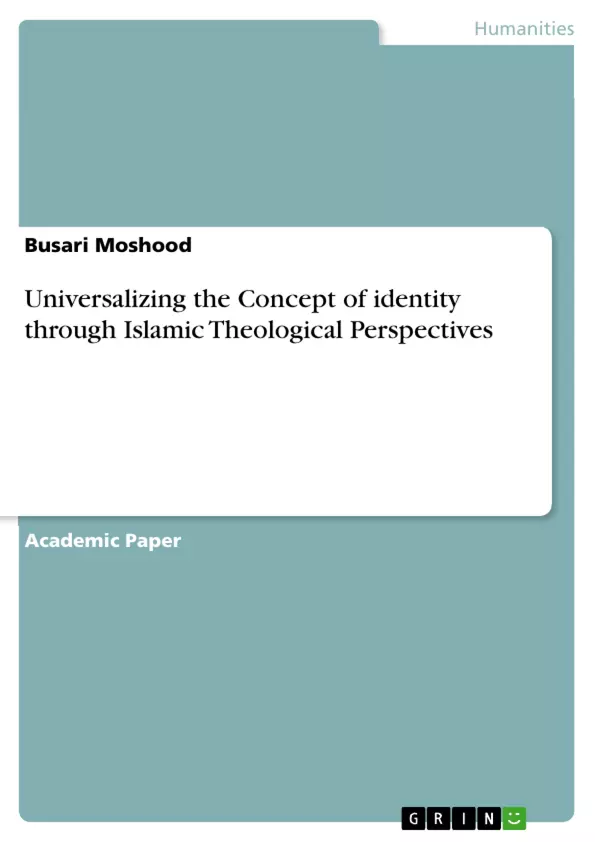This paper discusses the universality of the concept of identity from the perspective of Islam. This perspective of Islam was deemed necessary as a gap to be filled at ensuring that identity completes its course of universality as a concept. Therefore, the study subjects identity in its types to a Qur’ᾱnic critique with a view to identifying those that are in tandem with the tenets of Islam and those that are at variance with them. The contributions of Islam were critically discussed from four major schools of identity around the Muslim world. These schools with different formational motives and objectives were identified as the traditionalist, the reactionary, the non-conformist and the modernist.
The paper argues that the four schools of identity, in spite of their differences, were formed towards the achievement of the same goal of preserving the sanctity of Islam but using different theological mechanisms. With the perspective of Islam, identity as a concept was adjudged to have completed its cycle of universality. Conclusively, it was advanced that the primary basis in the formation of the four schools of identity is the Qur’ᾱn.
Inhaltsverzeichnis (Table of Contents)
- Introduction
- Definitions and Meanings of Identity
- Types of Identity
- Major Schools of Islamic Thought on Identity.
- The Secularists and Identity..
- Theologising the Types of Identity.
- Conclusion.....
Zielsetzung und Themenschwerpunkte (Objectives and Key Themes)
This paper aims to explore the concept of identity from an Islamic perspective, focusing on its universality and the diverse interpretations within different schools of thought. It analyzes the various meanings and types of identity, examining how Islam addresses the complexities of identity formation.
- Universality of the concept of identity
- Different schools of Islamic thought on identity
- Theological perspectives on identity formation
- Types of identity, including gender, racial/ethnic, sexual, class, moral, and religious
- Role of the Qur'an in shaping Islamic understanding of identity
Zusammenfassung der Kapitel (Chapter Summaries)
- Introduction: This chapter introduces the concept of identity as a universal phenomenon, highlighting its importance in human experience and the potential for conflict arising from different identity types. It sets the stage for exploring the Islamic perspective on identity.
- Definitions and Meanings of Identity: This chapter delves into the multifaceted nature of identity, examining various definitions and meanings drawn from different fields of research. It highlights the challenge of providing a comprehensive definition due to the complexity and contextual nature of identity.
- Types of Identity: This chapter explores different types of identity, including gender, racial/ethnic, sexual, class, moral, and religious. It provides an overview of each type and its significance within broader societal contexts.
- Major Schools of Islamic Thought on Identity.: This chapter focuses on the various schools of thought within Islam regarding identity formation. It analyzes the perspectives of traditionalist, reactionary, non-conformist, and modernist schools, highlighting their different approaches to understanding and interpreting Islamic teachings on identity.
Schlüsselwörter (Keywords)
The paper's key themes and concepts include identity, Islamic theology, universality, traditionalist, reactionary, non-conformist, modernist, Qur'an, and different schools of thought within Islam. It explores the role of Islamic perspectives in shaping understandings of identity within a global context.
What is the Islamic perspective on identity?
The Islamic perspective views identity through the lens of the Qur’ᾱn, evaluating different types of identity based on their alignment with Islamic tenets.
What are the four major schools of identity in the Muslim world?
The study identifies the Traditionalist, the Reactionary, the Non-conformist, and the Modernist schools of thought.
Do these schools have the same goal?
Yes, the paper argues that despite their different theological mechanisms, all four schools aim to preserve the sanctity of Islam.
Which types of identity are discussed in the paper?
The paper covers gender, racial/ethnic, sexual, class, moral, and religious identities.
How does the Qur'an influence identity formation?
The Qur'an serves as the primary basis for all Islamic schools of thought, providing the ethical and theological framework for understanding one's place in the world.



